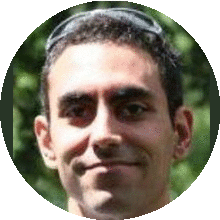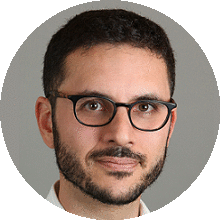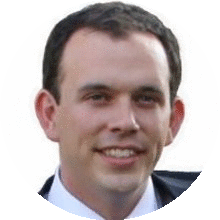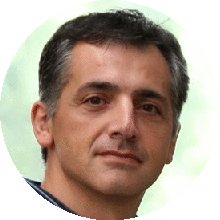Tuesday 26.6
09:00 - 09:15 Welcome & Introduction
09:15 - 09:55 Bruce Maggs, vice president research at Akamai and Professor at Duke University, USA
A Speed-of-Light Internet Service Provider
A variety of network applications, including electronic commerce and games, are either enabled by or benefit greatly from low latency communications. Studies have shown, however, that over medium and long distances the time to send a packet from one city to another on the public Internet is typically more than three times larger than the lower bound implied by the speed of light in free space. Hence for applications like high-frequency trading, where the winner of a communications race receives all the benefits, special purpose networks have been deployed. For example, between New Jersey and Chicago a succession of networks has been deployed, first fiber-based and then microwave-based, with each network reducing latency by a fraction of a millisecond over the previous. This talk explores the possibility of using the same radio technology to build a network backbone spanning the 120 largest population centers in the United States. The design places radios on existing towers, using topographic maps to ensure line-of-sight connectivity between towers. The impact of weather on the network is evaluated using historical weather data. Our analysis suggests that it should be possible to achieve mean speeds of over 95% of the speed of light over medium and long distances at a transmission cost of under $1 per GB.
Bio: Bruce Maggs received the S.B., S.M., and Ph.D. degrees in computer science from the Massachusetts Institute of Technology in 1985, 1986, and 1989, respectively. His advisor was Charles Leiserson. After spending one year as a Postdoctoral Associate at MIT, he worked as a Research Scientist at NEC Research Institute in Princeton from 1990 to 1993. In 1994, he moved to Carnegie Mellon, where he stayed until joining Duke University in 2009 as a Professor in the Department of Computer Science. While on a two-year leave-of-absence from Carnegie Mellon, Maggs helped to launch Akamai Technologies, serving as its first Vice President for Research and Development. He retains a part-time role at Akamai as Vice President for Research. In 2017 he won the Best Dataset Award at the Passive and Active Measurement Conference, The Best Paper Award at CoNEXT, a Distinguished Paper Award at USENIX Security, and the 2017 IEEE Cybersecurity Innovation Award for work that appeared at IEEE Security and Privacy. In 2018 he was part of a large team that received the inaugural SIGCOMM Networking Systems Award for the Akamai CDN.
09:55 - 10:30 Bernhard Haslhofer, senior data scientist at AIT Digital Insight Lab, Austria
Measurements in Cryptocurrency Networks
Cryptocurrencies such as Bitcoin have gone beyond the status of an idealistic experiment and now attract considerable public attention and scrutiny. Because of the general availability of transaction data from the underlying blockchain they have also become a fertile ground for commercial analytics services and research in various disciplines. Understanding the structures and monetary flows in cryptocurrency ecosystems, which can be represented as networks, has become a core analytics task in this field. This talk will provide an overview of known quantitative methods for analyzing cryptocurrency ecosystems from a network perspective and outline possible application scenarios. It will also provide an outlook on emerging Post-Bitcoin cryptocurrencies such as Monero and Zcash and their effect of known analytics procedures.
Bio: Bernhard Haslhofer works as a Senior Scientist at the Austrian Institute of Technology's Digital Insight Lab. Previously, he was an EU Marie Curie Fellow at Cornell University Information Science (NY, USA) and a PostDoc at the University of Vienna from where he also received his Ph.D in Computer Science. He also holds Master's degrees in Economics and Computer Science. He usually works in multidisciplinary settings to which he contributes methods drawn from fields like Machine Learning, Network Analytics, or Information Retrieval and Text Mining. At the moment, he primarily works on investigating and developing novel methods for analyzing cryptocurrency ecosystems such as Bitcoin.
10:30 - 11:00 Coffee Break
11:00 - 11:35 Georgios Smaragdakis, professor at TU-Berlin and Research affiliate at MIT, Germany/USA
Shedding Light on Internet's Critical Peering Infrastructure Outages
Peering infrastructures, namely, colocation facilities and Internet exchange points, are located in every major city, have hundreds of network members, and support hundreds of thousands of interconnections around the globe. These infrastructures are well provisioned and managed, but outages have to be expected, e.g., due to power failures, human errors, attacks, and natural disasters. However, little is known about the frequency and impact of outages at these critical infrastructures with high peering concentration.
In this talk, I will present our recent research work that tries to assess the state and health of the Internet and its performance under stress using the lens of Internet measurements. I first show how we utilize available, yet unexplored, information that is propagated using Internet protocols to map critical components of the Internet peering infrastructure and create a first-of-its-kind physical connectivity map of the Internet. Then I will show how we can use this map and augment our approach with passive and controlled active measurements to (i) detect peering infrastructure failures around the globe, (ii) pinpoint the epicenter of the failure, and (iii) assess the impact of such failures to other infrastructures and end-users. The insights gained by our study can inform peering and regulatory decisions to improve Internet resilience and investigate outages based on hard evidence.
Bio: Georgios Smaragdakis is currently a Professor with Technical University (TU) Berlin, a research affiliate with the Massachusetts Institute of Technology (MIT) Computer Science and Artificial Intelligent Laboratory (CSAIL) and the MIT Internet Policy Research Initiative (IPRI), and a research collaborator with Akamai Technologies. From 2014-2017 he was a Marie Curie fellow at the MIT CSAIL. From 2008-2014 he acted as Senior Researcher at Deutsche Telekom Laboratories and at the TU Berlin. In 2008 he was a research intern at Telefonica Research. He earned the Ph.D. degree in Computer Science from Boston University in 2009 and the Diploma in Electronic and Computer Engineering from the Technical University of Crete. His research interests include Internet measurement, content distribution, Web and content delivery analytics, Internet policy, Internet security and resilience, and personal data privacy protection. George's research was awarded a European Research Council Starting Grant Award (2015), a Marie Curie International Outgoing Fellowship (2013), and best paper awards at IEEE INFOCOM (2017), ACM IMC (2016 and 2011) and ACM CoNEXT (2015).
11:35 - 12:10 Felipe Huici, chief researcher at NEC Europe Labs, Germany
My VM is Lighter (and Safer) than your Container
Datacenters and cloud-based systems are fundamental to the way networks operate and how services are provided to end users. Within this space, containers have, as of late, received a lot of attention because they are lightweight when compared to virtual machines. On the downside, containers offer weaker isolation than VMs, to the point where people run containers in virtual machines to achieve proper isolation. In this talk, we examine whether there is indeed a strict tradeoff between isolation (VMs) and efficiency (containers). We find that VMs can be as nimble as containers, as long as they are small and the toolstack is fast enough. We achieve lightweight VMs by using unikernels for specialized applications and with Tinyx, a tool that enables creating tailor-made, trimmed-down Linux virtual machines. By themselves, lightweight virtual machines are not enough to ensure good performance since the virtualization control plane (the toolstack) becomes the performance bottleneck. We present LightVM, a new virtualization solution based on Xen that is optimized to offer fast boot-times regardless of the number of active VMs. LightVM features a complete redesign of Xen’s control plane, transforming its centralized operation to a distributed one where interactions with the hypervisor are reduced to a minimum. LightVM can boot a VM in 2.3ms, comparable to fork/exec on Linux (1ms), and two orders of magnitude faster than Docker. LightVM can pack thousands of LightVM guests on modest hardware with memory and CPU usage comparable to that of processes.
Bio: Felipe Huici is a chief researcher in the Systems and Machine Learning Group at NEC Laboratories Europe in Heidelberg, Germany. His main research and work interests lie in the areas of high-performance software systems, and in particular specialization, virtualization, and the application of machine learning techniques to tackle open problems in the systems area. Previously, he received an undergraduate degree from the University of Virginia, and a Masters and Ph.D. also University College London. He has published on several top-tier conferences and journals such as SOSP, SIGCOMM, NSDI, CoNEXT, and SIGCOMM CCR and regularly acts as TPC member of conferences and journals such as IMC, INFOCOM, CoNEXT and SIGCOMM CCR.
12:10 - 12:45 Tobias Hoßfeld, professor at the Chair of Communication Networks at the University of Würzburg, Germany
QoE-Driven Networking
Quality of Experience (QoE) has received much attention over the past years and is defined as is the degree of delight or annoyance of the user of an application or service. For various stakeholders QoE has become a prominent issue for delivering services and applications. A significant amount of research has been devoted to understanding, measuring, and modeling QoE for a variety of media services. In this talk, emerging challenges and concepts are discussed for managing QoE for networked media services. The following topics are addressed: multi-factor QoE modeling, QoE metrics and QoE fairness for QoE management, as well as recent efforts for web QoE monitoring. Finally, QoE++ is postulated, the evolution from the QoE ego-system towards the QoE eco-systems.
Bio: Tobias Hoßfeld is full professor at the Chair of Communication Networks at the University of Würzburg, Germany, since 2018. He finished his PhD in 2009 and his professorial thesis (habilitation) "Modeling and Analysis of Internet Applications and Services" in 2013 at the University of Würzburg. From 2014 to 2018, he was head of the Chair "Modeling of Adaptive Systems" at the University of Duisburg-Essen, Germany. He has published more than 100 research papers in major conferences and journals and received the Fred W. Ellersick Prize 2013 (IEEE Communications Society) for one of his articles on QoE. Among others, he is member of the advisory board of the ITC (International Teletraffic Congress) and the editorial board of IEEE Communications Surveys & Tutorials.
12:45 - 14:15 Lunch Break
14:15 - 14:55 Edo Liberty, principal scientist at AWS and head of Amazon AI Labs, USA
Amazon SageMaker: Infinitely Scalable Machine Learning Algorithms
Artificial intelligence and machine learning are already transforming the technological landscape. Machine learning is one such transformational technology that is top of mind not only for CIOs and CEOs, but also developers and data scientists. November 2017, Amazon launched SageMaker to make the problem of authoring, training, and hosting ML models easier, faster, and more reliable,. Now, thousands of customers are using Amazon SageMaker and building ML models on top of their data lakes in AWS. This talk lifts the veil on some of the scientific, system design, and engineering decisions behind the conception of SageMaker.
Bio: Edo Liberty is a Principal Scientist at AWS and the head of Amazon AI Labs. Amazon AI Labs is a unique organization of world class scientists and prodigious engineers. Together, they build the core algorithmic and machine learning components for many AWS services, including SageMaker. Before joining Amazon, Edo led Yahoo Research in New York and Yahoo’s Scalable Machine Learning group. He was a postdoctoral fellow in Applied Mathematics at Yale where he also received his PhD in Computer Science. His research interests include dimensionality reduction, clustering, optimization, streaming and online algorithms, machine learning, and large scale numerical linear algebra. He is the author of more than thirty academic papers on these topics including award winning works on streaming matrix approximation and fast random projections. Edo is frequent keynote speaker, tutorial presenter, and committee member at international conferences.
14:55 - 15:30 Jérémie Leguay, principal engineer at Huawei Technologies, France
Anticipatory Networking with Machine Learning
The emergence of powerful cloud-based network controllers is an opportunity to intelligently control networks with advanced machine learning and optimization techniques. Indeed, network controllers will be able to be more proactive and to take more informed decisions. They will be able to learn about the network environment from historical data, recognize traffic patterns and anticipate the impact of their decisions. This presentation will introduce recent contributions on anticipatory networking using machine learning. In particular, two contributions on QoE aware networking and robust routing with traffic predictions.
Bio: Jérémie Leguay received a Ph.D. degree from Pierre & Marie Curie University where he worked jointly for the Computer Science LIP6 laboratory and Thales Communications (Paris area, France). He was awarded the Thales Ph.D Prize for this work in 2007. From 2007 to 2014, he stayed at Thales Communications & Security to work on networked systems where he especially developed activities on sensor networks, mobile networks and software-defined networks. Jérémie Leguay has been the coordinator of the FP7 CALIPSO project on low-power protocols for the Internet of Things and the FP7 iTETRIS project on vehicular networks. In 2014, he joined the Mathematical and Algorithmic Sciences Lab at Huawei Technologies (Boulogne-Billancourt, France) at Principal Engineer and leader of the Network and Traffic Optimization team. His current research activities are on the control and management of IP and optical networks using optimization and machine learning tools.
15:30 - 16:00 Coffee Break
16:00 - 16:35 Gerardo Rubino, senior researcher at INRIA, France
Random Neural Networks and Extensions. Applications to Networking
Random Neural Networks are networks composed of Random Neurons, a specific type of artificial neuron based on queuing models. They have been invented by Erol Gelenbe at the end of last century, and they offer interesting properties for Machine Learning applications. They have been applied in many fields, including in combinatorial optimization. We will briefly describe them and some of their properties. In particular, we will discuss their use in Supervised Learning, and our experience with these tools at the heart of our PSQA technology (PSQA stands for Pseudo-Subjective Quality Assessment), developed at INRIA and capable of providing a numerical (that is, quantitative) and accurate (meaning highly correlated with the results of subjective tests) estimation of the perceived quality (PQ) of a video, voice or audio flow received on an IP network, automatically and in real time if necessary. PQ is the main component of the QoE (Quality of Experience) of audio/video-based applications and services on the Internet. We will then present an extension we recently developed for the prediction of time series, whose goal is to be able to predict the QoE instead of measuring its present value. This extension is a mix between Random Neural Networks and Reservoir Computing architectures, mainly Echo State Networks.
Bio: Gerardo Rubino is a senior researcher at INRIA (the French National Institute for Research in Computer Science and Control) where he is the leader of the DIONYSOS group, working on the analysis and design of networking technologies. He is a Board Member of the Media & Networks Cluster, Brittany, France, and INRIA’s representative at the SISCom Brittany Research Cluster. Among past responsibilities, he has been Scientific Delegate for the Rennes unit of INRIA for 5 years, responsible of research in networking at the Telecom Bretagne engineering school for 5 years, Associate Editor of the Operations Research international journal “Naval Research Logistics” for 9 years, former member of the Steering Board of the European Network of Excellence EuroFGI and responsible of the relationships between the network and European industry. He has also been the head of the International Partnership Office at INRIA Rennes for 5 years. He is a member of the IFIP WG 7.3. He is interested in quantitative analysis of complex systems using probabilistic models. He presently works on performance and dependability analysis, perceptual quality assessment of audio and video applications and services and on Machine Learning tools in networking. In particular, he is the author of the PSQA (Pseudo-Subjective Quality Assessment) technology for automatic perceptual quality real-time evaluation. He also works on the development of methodologies for the analysis of rare events, for instance for the evaluation of risks (he is a member of the Steering Committee of RESIM, the only workshop dedicated to the topic, and co-author of the book entitled “Rare Event Simulation Using Monte Carlo Methods”, Wiley, 2009). He is the author of more than 200 scientific works in applied mathematics and computer science.
16:35 - 17:10 Anja Feldmann, director at the Max Planck Institute for Informatics, Germany
Distributed Data Collection and Processing at Scale
In this talk I will first report on some recent work on detecting, classifying, and analyzing traffic with spoofed source IP addresses. Then I will discuss some findings on DDoS mitigation techniques, namely blackholing, before I propose a novel system, Flowstream, for distributed data analysis at scale.
Bio: Anja Feldmann studied computer science at Universitaet Paderborn in Germany and received her degree in 1990. After that she continued her studies at Carnegie Mellon University, where she earned her M.Sc. in 1991 and, four years later, her Ph.D. The next four years she did postdoctoral work at AT&T Labs Research, before holding research positions at Saarland University and the Technical University Munich. Since 2006, she has been professor of Internet Network Architectures at Telekom Innovation Laboratories at Technische Universitaet Berlin. In May 2012, she was elected the first woman on the employer side of the Supervisory Board of SAP. Since the beginning of 2018 she is director at the Max Planck Institute for Informatics in Saarbruecken.
17:10 - 17:45 Fabián Bustamante, professor at Northwestern University, USA
Browsing Over Clouds - Characterizing and Improving the in-flight Network Experience
Ubiquitous, always-on connectivity has moved from a vision statement to an assumed reality in much of the developed world. Leveraging this expectation, several airlines now offer in-flight connectivity (IFC) among their extra amenities in commercial flights. Since first appearing on the market in 2004, IFC has gained broad adoption with over 40% of top 100 airlines offering it, and is quickly moving from a luxury to a necessity. Despite its growing importance and the many interesting challenges with providing connectivity while flying 10,000 meters above ground at 500km/h, we lack even a basic understanding of its current and potential capabilities and the impact those may have on users' experience. In this talk, I will discuss some recent and ongoing work toward characterizing IFC from end users, the challenges we have identified and some of our early efforts to address them.
Bio: Fabián E. Bustamante (PhD/MS Georgia Tech '97/01) is a Professor of Computer Science at Northwestern University. His research interests span several areas of networking and distributed systems, with a focus on characterizing networked systems from the perspective of end users and designing new and improve systems based on the gain insights. As part of their work, he and his research group have released tens of open-source systems that together have gained over 1.5 million users worldwide. Fabián currently serve as Lead Scientist at Phenix Inc., a Chicago-based startup focused on scalable, real-time broadcasting. He is an ACM and IEEE senior member, a recipient of the National Science Foundation CAREER award and the Science Foundation of Ireland E.T.S. Walton Visitor Award.
17:45 - 18:00 Closing
18:00 - 22:00 Conference Welcome Reception
The welcome reception takes place in the same building of the conference, at the Tech Gate Vienna tower terrace.











